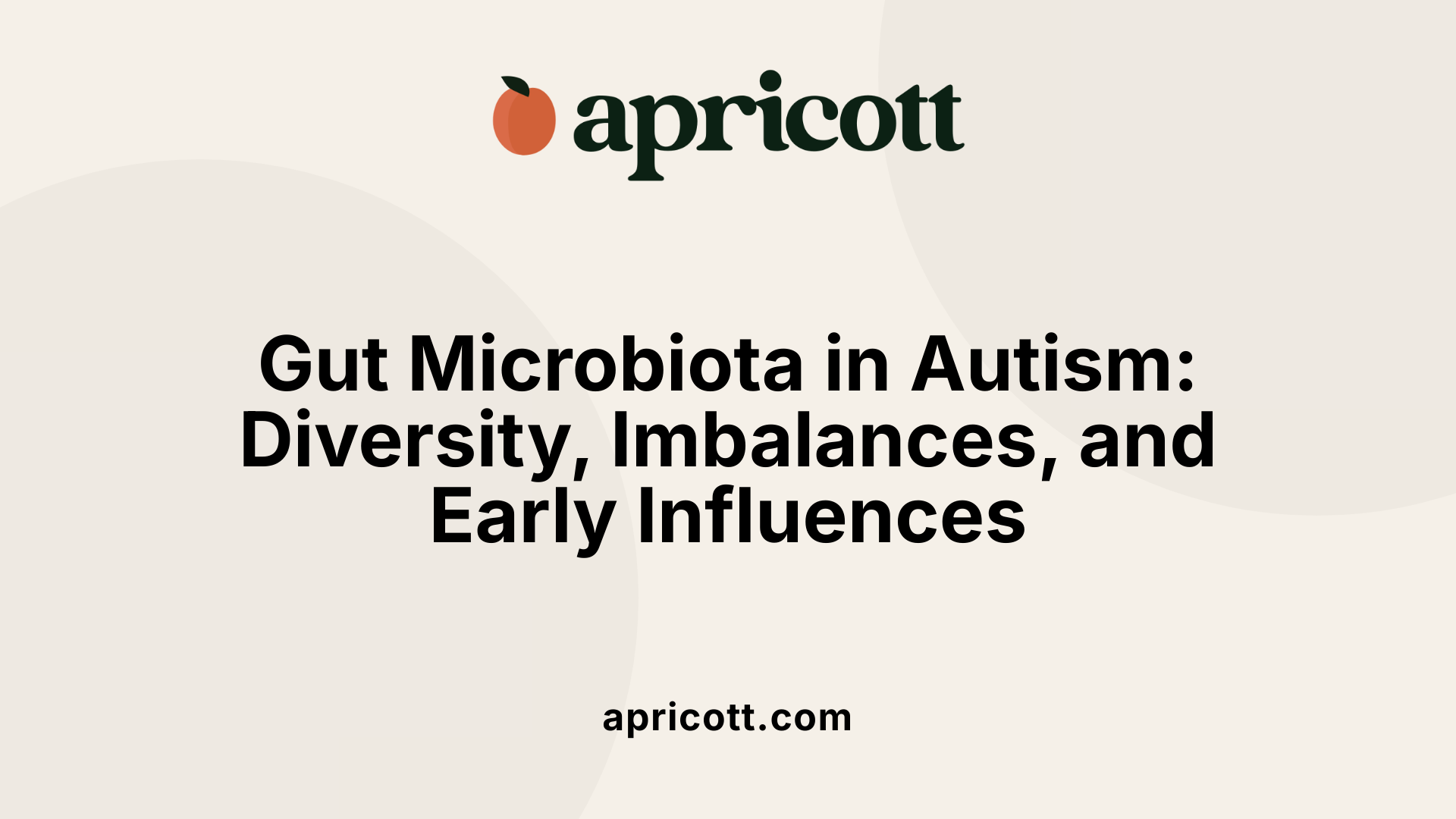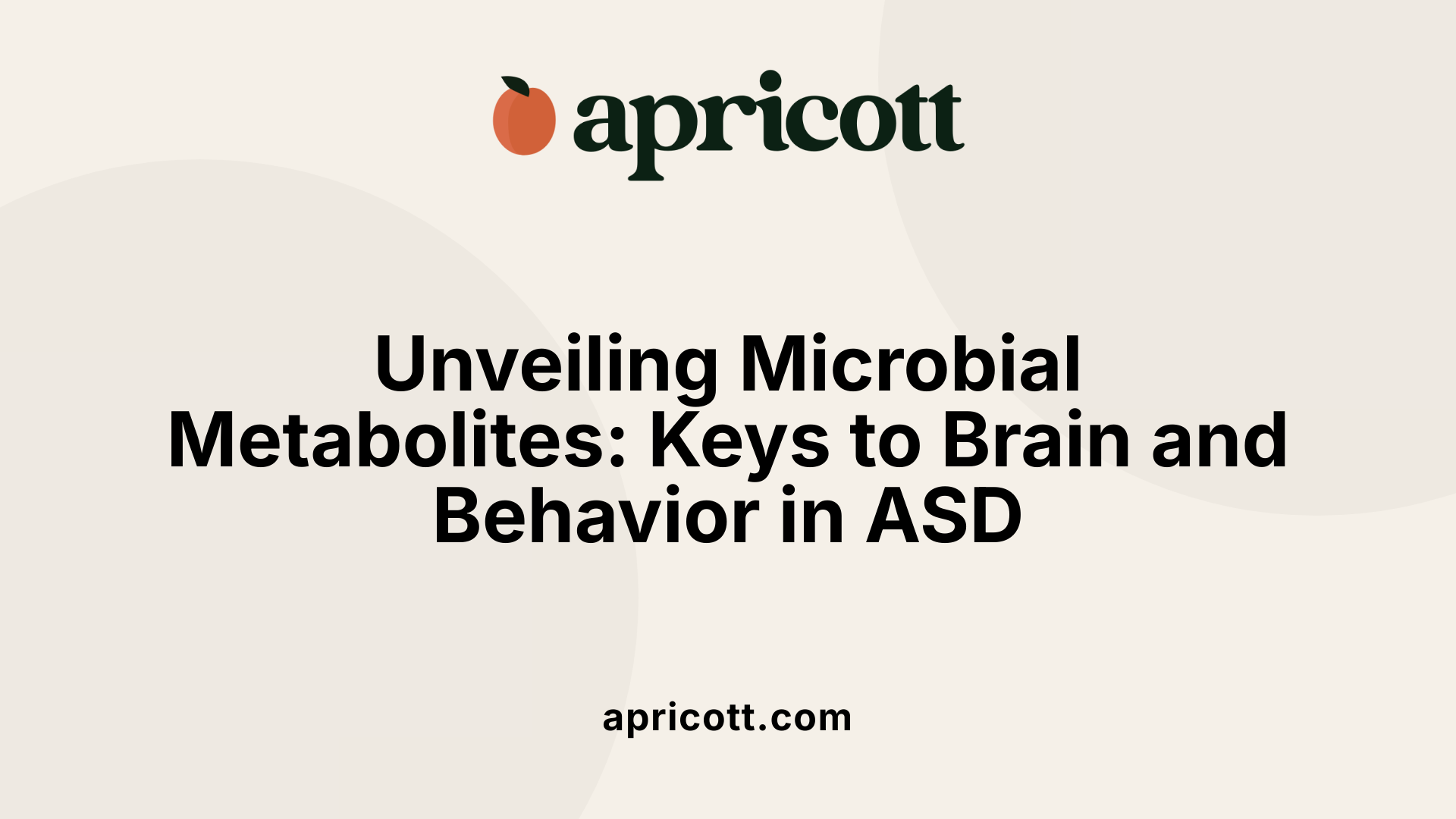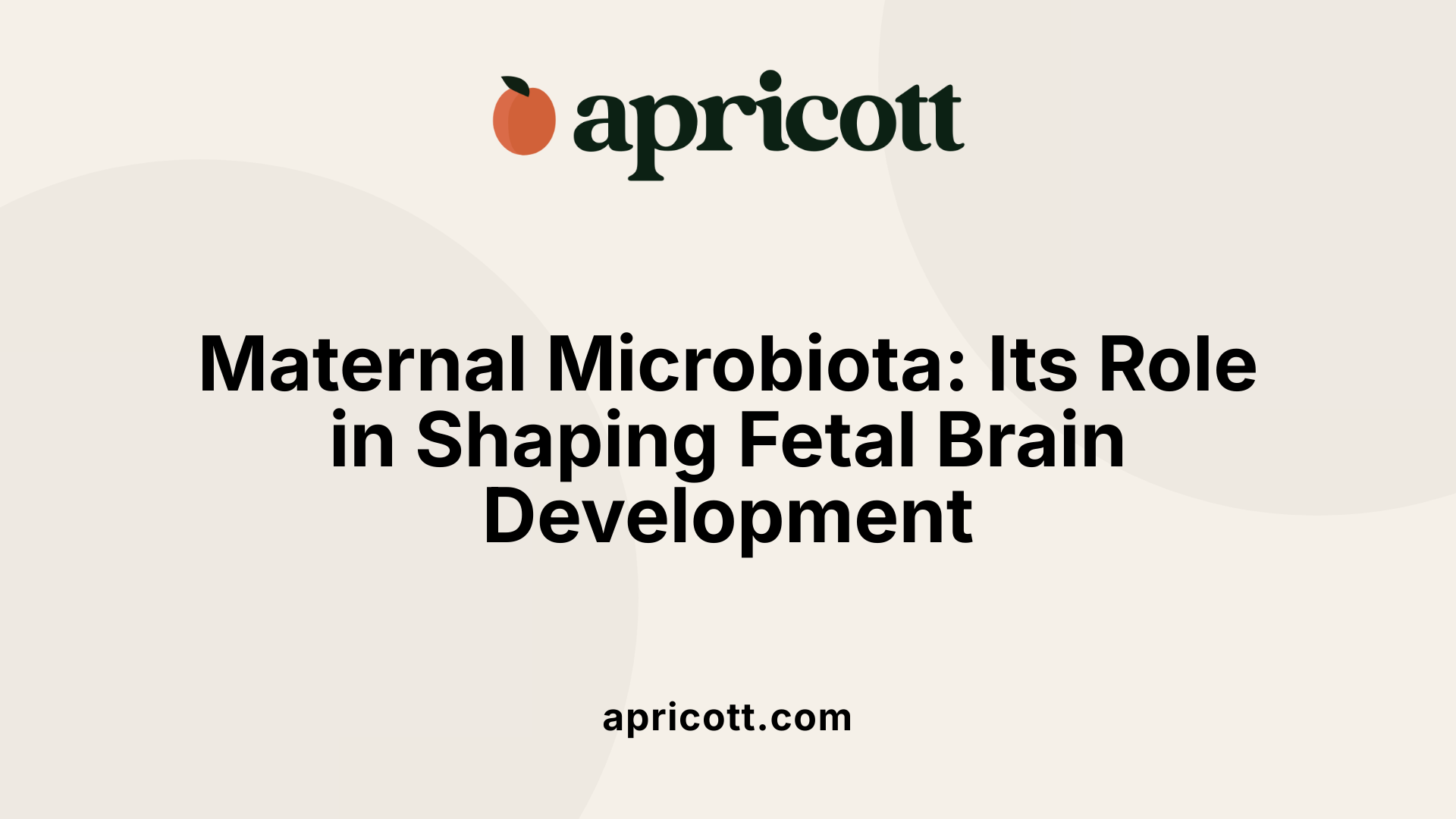December 2, 2025
Exploring the Complex Link Between Gut Microbiota and Autism Spectrum Disorder
Emerging research highlights the intricate relationship between gut health and autism spectrum disorder (ASD). The gut-brain axis, a dynamic communication network linking the gastrointestinal system and the brain, may play a pivotal role in the development and management of ASD symptoms. This article examines how gut microbiota composition, microbial metabolites, and immune responses influence neurological development and behavior in ASD, alongside current and future therapeutic approaches.
The microbiota–gut–brain axis is a complex, bidirectional communication network connecting the gastrointestinal tract and the brain. It involves neural routes like the vagus nerve, hormonal signaling, immune system responses, and metabolic pathways through microbial metabolites. This axis enables gut bacteria to influence brain function, behavior, and neurological health, and conversely, allows the brain to affect gut activity.
Gut microbes produce metabolites such as short-chain fatty acids (SCFAs), neurotransmitters like serotonin, and other bioactive compounds that cross the intestinal barrier and even the blood-brain barrier. These compounds impact neural signaling and brain development. Additionally, immune activation caused by microbial dysbiosis can lead to neuroinflammation, affecting brain function and behavior.
Alterations in gut microbiota composition and diversity are frequently observed in individuals with autism spectrum disorder (ASD). This dysbiosis can disrupt normal gut-brain communication, contributing to core ASD symptoms like social difficulties and repetitive behaviors. Mechanisms include altered production of neuroactive metabolites, immune system activation, and increased intestinal permeability, which may exacerbate neurodevelopmental abnormalities. Thus, the microbiota–gut–brain axis plays a significant role in ASD pathogenesis and represents a promising target for therapeutic intervention.

Children with autism spectrum disorder (ASD) typically show significant differences in their gut microbiota compared to neurotypical children. One notable feature is a reduction in microbial diversity, meaning fewer types of bacteria are present. This reduced diversity is often accompanied by imbalances where certain bacterial groups become more or less abundant.
For example, increases in bacteria like Clostridium species are common. These bacteria are known to produce metabolites and neurotoxins that may negatively impact the nervous system, potentially worsening ASD symptoms. Conversely, beneficial bacteria such as Lactobacillus tend to be less abundant in children with ASD. Lower levels of these helpful microbes might diminish protective effects, including those related to gut integrity and immune modulation.
The composition of gut microbiota in children with ASD is shaped significantly by factors in early life. The mode of delivery is critical—infants born vaginally acquire beneficial microbes like Lactobacillus from their mother’s birth canal, while those delivered by C-section often have altered microbiota dominated by bacteria such as Enterococcus and Staphylococcus. These differences may correlate with an increased risk for ASD.
Additionally, the use of antibiotics during early childhood can disrupt healthy microbial colonization, leading to gut dysbiosis. This imbalance potentially contributes to neurodevelopmental challenges associated with ASD.
Diet and early colonization patterns also influence microbial profiles, impacting the production of important microbial metabolites like short-chain fatty acids (SCFAs). Such metabolites are critical in gut-brain communication and may play roles in the development or mitigation of ASD symptoms.
Understanding how these microbial changes relate to ASD provides insight into possible therapeutic interventions, including probiotics or dietary adjustments aimed at restoring beneficial microbial communities.
| Aspect | Observations in ASD Gut Microbiota | Possible Implications |
|---|---|---|
| Microbial Diversity | Decreased diversity compared to neurotypical children | Linked to impaired gut-brain signaling |
| Bacterial Imbalances | Increased Clostridium, decreased Lactobacillus | Neurotoxic effects, reduced neuroprotection |
| Early-life Factors | C-section delivery, antibiotic use disrupt normal colonization | Associated with higher ASD risk |
| Metabolite Production | Altered SCFA levels affecting neurological development | Impact on neuroinflammation and behavior |

Children with autism spectrum disorder (ASD) often suffer from various gastrointestinal (GI) symptoms. These include constipation, diarrhea, abdominal pain, and gastroesophageal reflux disease (GERD). Studies estimate that up to 80% of children with ASD experience some form of GI distress.
The presence of GI problems in ASD is closely linked to behavioral challenges. Children with GI distress frequently show higher levels of anxiety, increased rigid or compulsive behaviors, and greater irritability or agitation. These symptoms suggest that gut discomfort may exacerbate core features of autism and affect overall well-being.
Emerging research highlights that an overactive immune response and increased intestinal permeability—often called "leaky gut"—contribute to GI symptoms and behavioral manifestations in ASD. A compromised gut barrier allows microbial components, such as lipopolysaccharides, to enter systemic circulation, triggering inflammation that may affect the brain. This neuroinflammation is thought to amplify both gastrointestinal and behavioral symptoms, linking gut health with neurological function.
Collectively, gastrointestinal issues are not only prevalent in ASD but also significantly impact behavioral features. Addressing gut health may therefore provide a pathway for alleviating some autistic symptoms through modulation of the immune system and reduction of gut inflammation.

Gut bacteria ferment dietary fibers to produce short-chain fatty acids (SCFAs) such as butyrate and propionate, which play distinct roles in neurological development. Butyrate is known for its neuroprotective effects, supporting brain health, whereas excess propionate has been linked to autism-like behaviors in animal studies. This balance of SCFAs is crucial, as disruptions may influence neural functioning and behavioral outcomes relevant to autism spectrum disorder (ASD).
The gut microbiome also modulates tryptophan metabolism, generating metabolites involved in neurotransmitter synthesis. Notably, compounds like kynurenine and kynurenate—key players in the tryptophan pathway—are found at lower levels in children with ASD. These metabolites are essential for producing neurotransmitters such as serotonin, which regulates emotional processing, social interaction, and cognition. Altered levels can disrupt brain region activity, especially in the insula and cingulate cortex, leading to increased ASD symptom severity.
Certain gut microbes produce neurotoxic compounds that may worsen ASD symptoms. For example, elevated levels of metabolites like 4-ethylphenyl sulfate (4EPS) can trigger neuroinflammation and negatively affect brain function. Children with ASD often show overall lower diversity and fewer neuroactive metabolites in their gut microbiota, which may impair gut-brain communication and contribute to both gastrointestinal and behavioral symptoms.
Microbial metabolites impact autism symptoms by modulating neurotransmitter systems and immune pathways. SCFAs and tryptophan-related metabolites cross the blood-brain barrier or activate neural pathways like the vagus nerve, altering brain signaling and connectivity. Disrupted metabolite profiles in ASD promote neuroinflammation and change brain activity patterns, thereby influencing behaviors such as sensory sensitivities, social deficits, and emotional regulation.
| Microbial Metabolite | Effect on Brain and Behavior | Relevance to ASD |
|---|---|---|
| Butyrate | Neuroprotective, supports neural health | Lower butyrate linked with ASD-associated dysbiosis |
| Propionate | Excess can induce autism-like behaviors in models | Elevated in some ASD gut profiles |
| Kynurenine/Kynurenate | Modulate serotonin production, affect cognition | Decreased levels correlate with ASD severity |
| 4-ethylphenyl sulfate (4EPS) | Neurotoxic, promotes neuroinflammation | Higher levels linked to ASD symptoms |
Overall, microbial metabolites serve as vital mediators of the microbiota–gut–brain axis, shaping the neurological and behavioral features observed in autism.

Maternal microbiota during pregnancy plays a crucial role in shaping fetal neurodevelopment. Colonization with specific bacteria like Clostridia can negatively influence fetal brain gene expression and connectivity, potentially increasing the risk of autism spectrum disorder (ASD).
Infections during pregnancy can trigger maternal immune activation (MIA), elevating inflammatory signaling molecules such as interleukin-17a (IL-17a). Elevated IL-17a targets neural receptors in the fetus, leading to disruptions in brain development and the emergence of autism-like behaviors in animal models.
MIA not only affects brain development but also induces intestinal inflammation and immune dysregulation in offspring. This gut immune priming is linked with ASD behaviors, highlighting the interplay between prenatal immune challenges and postnatal neurodevelopmental outcomes.
Together, these findings suggest that maternal microbiota composition and immune activation during pregnancy profoundly impact fetal brain development and intestinal health, thereby influencing ASD risk.
Microbiota-targeted therapies such as probiotics, prebiotics, and fecal microbiota transplantation (FMT) have emerged as promising approaches to address autism spectrum disorder (ASD).
Probiotics involve administering beneficial bacterial strains to restore balance in the gut microbiome. Prebiotics, on the other hand, are nondigestible fibers that promote the growth of healthy bacteria already present in the gut. FMT transfers gut microbiota from healthy donors to individuals with ASD, aiming to correct dysbiosis and improve gut microbial diversity.
Clinical trials exploring these microbiota therapeutics have reported encouraging results. Many children with ASD treated with probiotics or FMT have shown significant improvements in gastrointestinal symptoms like constipation, diarrhea, and abdominal discomfort. Behavioral improvements, including reduced irritability, anxiety, and repetitive behaviors, have also been documented.
FMT, in particular, demonstrates sustained improvements months after treatment, highlighting its potential for long-term benefit. However, these studies often emphasize the need for more rigorous, placebo-controlled trials to confirm efficacy and safety.
Gut microbiota interventions represent a novel therapeutic avenue that targets core gastrointestinal and neurological features of ASD by addressing the gut-brain axis. They hold the potential to improve quality of life in affected individuals.
Nevertheless, challenges remain. The variability in individual microbiota profiles and the complexity of ASD symptoms complicate standardized treatment. Long-term effects and safety profiles of FMT and probiotics require further investigation. Ethical concerns around donor selection and transplantation procedures also need addressing.
In summary, while microbiota therapeutics for ASD offer promising benefits, ongoing research is essential to optimize treatment protocols, ensure safety, and establish lasting efficacy.
Applied Behavior Analysis (ABA) therapy is a scientific approach that studies how environmental factors influence behavior and uses this understanding to improve specific actions. By applying evidence-based techniques like positive reinforcement, ABA aims to increase desirable behaviors and decrease challenging ones. Individualized for each person, ABA therapy is delivered by qualified professionals to best support developmental goals.
ABA therapy helps individuals with autism spectrum disorder (ASD) develop important skills, including communication, social interaction, and daily living abilities. It also addresses challenging behaviors, promoting greater independence and enhancing quality of life. Structured, consistent interventions allow gradual progress in skill acquisition and behavior management.
ABA therapy is primarily provided by Board Certified Behavior Analysts (BCBAs), who undergo comprehensive education and supervised training. Behavior technicians and therapists who deliver ABA services receive specialized training and work under BCBA supervision to maintain therapy quality and consistency.
Common techniques include positive reinforcement to reward desired behaviors, prompting to encourage actions, discrete trial training which breaks skills into small steps, behavior chaining to connect sequences of behavior, fading to gradually remove prompts, extinction to reduce unwanted behaviors, and redirection to guide focus. These methods are flexibly combined to meet the individual's unique needs.
Effectiveness is measured by carefully tracking changes in targeted behaviors over time. Standardized assessments evaluate improvements in communication, social skills, and adaptive functioning. This data guides ongoing adjustments to the therapy plan to ensure continued progress toward goals.

Emerging evidence points to the promising potential of integrating gut microbiota modulation with traditional behavioral therapies for a comprehensive approach to autism spectrum disorder (ASD). Approaches such as probiotics, prebiotics, fecal microbiota transplantation (FMT), and dietary modifications aim to restore gut microbial balance, which influences neurological and behavioral symptoms through the gut-brain axis. When combined with established behavioral interventions like Applied Behavior Analysis (ABA), these microbiota-targeted treatments could provide synergistic benefits by addressing both physiological and behavioral aspects simultaneously.
This integrated strategy acknowledges that gut health impacts neurodevelopment, neurotransmitter production, and immune responses, all of which contribute to ASD symptoms. Thus, improving gut microbiota diversity and function may enhance responsiveness to behavioral therapies and overall developmental outcomes.
Early intervention remains critical in ASD management. Investigating and addressing gut health from infancy could potentially influence neurodevelopment during crucial periods, possibly reducing the severity or onset of ASD-associated symptoms. Factors like mode of delivery, antibiotic usage, and early microbial colonization shape the developing gut microbiome, suggesting a window for preventive or remedial strategies.
Simultaneously, early behavioral intervention such as ABA supports skill acquisition and reduces maladaptive behaviors. Combining these with early gut-targeted therapies could maximize efficacy by creating a healthier neuroimmune environment, enhancing learning ability and social functioning.
Despite encouraging preliminary findings, further rigorous research is essential to fully understand long-term safety, efficacy, and mechanistic pathways of microbiota-based therapies in ASD. Personalized approaches are particularly necessary, given the heterogeneity of ASD symptoms and gut microbiota profiles among individuals.
Future studies need to elucidate optimal treatment combinations, timing, and individual predictors of response, including genetic, environmental, and metabolic factors. Such precision medicine approaches will better tailor interventions, ultimately aiming to improve gastrointestinal and neurological outcomes concurrently.
Integrating microbiota-focused treatments within traditional behavioral frameworks holds promise for a holistic, multi-dimensional management strategy for ASD, reflecting the complex interplay between gut health and brain function.
The growing body of research underscores the profound impact of gut microbiota and its metabolites on brain function and behavior in autism spectrum disorder. Recognizing gastrointestinal symptoms and their neurological connections opens new avenues for targeted therapies such as probiotics and fecal microbiota transplantation. Meanwhile, Applied Behavior Analysis remains a cornerstone intervention, effectively addressing behavioral challenges through individualized, evidence-based methods. Integrating microbiota-targeted treatments with established behavioral therapies holds promise for holistic care that addresses both physiological and developmental aspects of autism. Continued interdisciplinary research and personalized approaches will be vital to advancing effective, safe interventions, ultimately improving quality of life for individuals with ASD and their families.